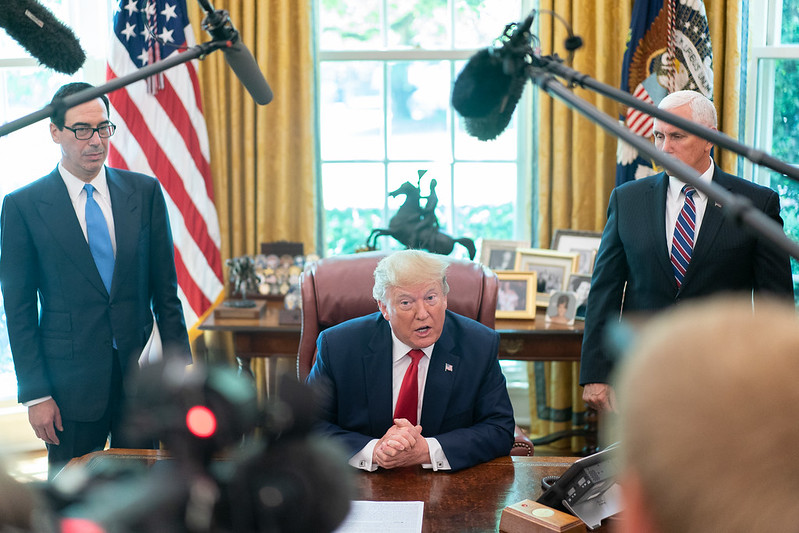 President Trump before signing an executive order on Iran sanctions in 2019
President Trump before signing an executive order on Iran sanctions in 2019
Despite Sanctions, Iran is Unlikely to Change its Behavior in 2020
Of the countries currently being hit by the coronavirus pandemic, Iran is facing some of the most severe effects. Combined with the American sanctions currently slamming the country’s economy, Iran is facing serious hurdles to overcome in the near future. New reports indicate that the UK, being sensitive to the humanitarian consequences of coronavirus, is privately advocating for the U.S. to ease sanctions on Iran. In the Trump administration’s eyes, Iran could ease its own pain, by agreeing to further American limitations on its nuclear program, and by changing its behavior in the Middle East. There are some indications certain behaviors may change, as indicated by reports that Iran may release some detained Americans, but it is unlikely we will see any major policy shifts by Iran in 2020. Thus, the standoff with Iran will remain unresolved this year.
For Iran, caving under the pressure of American sanctions will be incredibly delegitimizing. To the Iranian regime, giving in to American demands may be more risky than facing the current cost of sanctions and coronavirus combined. If Iran caves, it will be publicly identifying a sanctions strategy by which Iran can be pressured to change. This essentially provides a road map that could be used any time the United States wants to force Iran to bend to its will. From the Iranian perspective, this is unacceptable, particularly as it fears it will be used to renegotiate future deals.
It’s difficult to determine exactly how much pressure is needed to force Iran back to the negotiating table. When Iran agreed to the Joint Comprehensive Plan of Action in 2015, it was not yet at the point where it was unable to resist the unprecedented pressure being applied to it. By all accounts, the sanctions being applied by the U.S. today are actually doing more damage to Iran’s economy than the ones imposed prior to 2015. Though more of the world was united in applying pressure to Iran at that time, the secondary sanctions the U.S. is imposing on ran’s trading partners have been extremely effective in forcing them to deal additional economic damage to Iran. These secondary sanctions (sanctions against countries doing business with Iran) have caused those trading partners to withdraw much of their business, having the effect of instituting a de facto international sanctions regime against the country. It is not perfect, as Iran has succeeded in getting oil tankers to China and other countries, but Iran’s oil exports have been curtailed severely.
This extreme pain being inflicted on Iran hasn’t coerced it into changing its behavior. If there is a threshold below which Iran will throw in the proverbial towel, it’s a closely guarded secret. When two parties enter a negotiation, neither party wants to reveal its breaking point. If Iran negotiates, it will choose to do so at a point above its breaking point, where it is not yet desperate or unable to resist pressure. Iran’s goal is to avoid revealing that threshold, as doing so will severely weaken Iran’s bargaining position in the future. Maintaining this wiggle room allows Iran to maintain the leverage it needs to protect its strategic interests.
Even though the pain of sanctions is exacting a cost on Iran, it sees greater benefit in waiting for the results of the U.S. 2020 election before making decisions about behavioral changes. As Iran has thus far been able to weather the impact of sanctions, it is likely to continue to do so at the current level. The coronavirus is the major variable that may end up changing Iran’s strategic planning, but it has not yet reached a crisis level great enough.
Waiting for a new American president would be in line with Iran’s past behavior. During the Iranian hostage crisis, Iran refused to release the American hostages taken during the Carter administration until the day Reagan was inaugurated. Iran is clearly not interested in negotiating with the Trump administration, and any positive behavioral changes will likely be delayed until 2021 at the earliest, dependent on whether a new administration comes into office. Iran likely sees a better chance of seeking a favorable resolution to the new nuclear dispute, as the remaining Democratic candidates for president have advocated for rejoining the original Iran Deal. Should President Trump win reelection, Iran may reassess its strategy at that point, and reconsider whether 4 more years of sanctions is fathomable.
In the meantime, we can expect more of the same from Iran. We can expect it to continue to exceed the limits set by the JCPOA, and it will push and prod to test the pressure other countries are willing to exert against it. Iran was largely abiding by the deal prior to the U.S. withdrawal, but given the U.S. withdrawal and sanctions in place it no longer feels constrained. Iran’s ability to influence the U.S. to relent is extremely limited, and to compensate for that, it will push the envelope where it can, while trying to avoid a war it knows it will lose.





